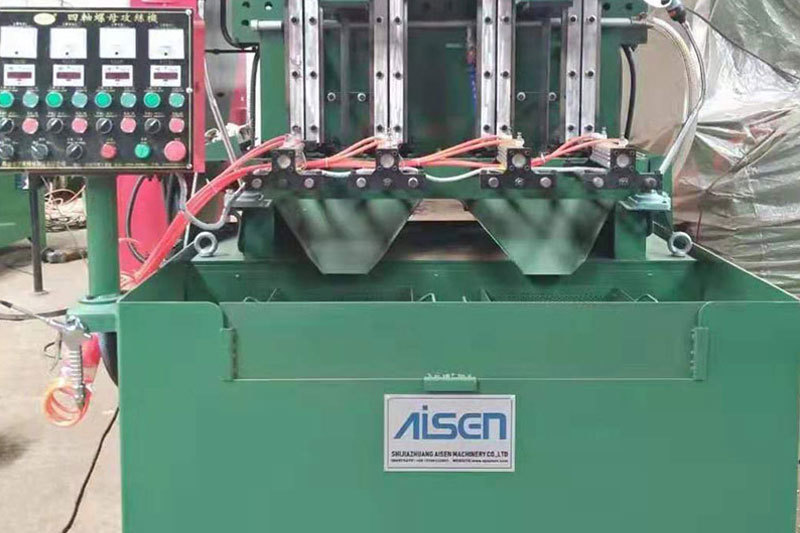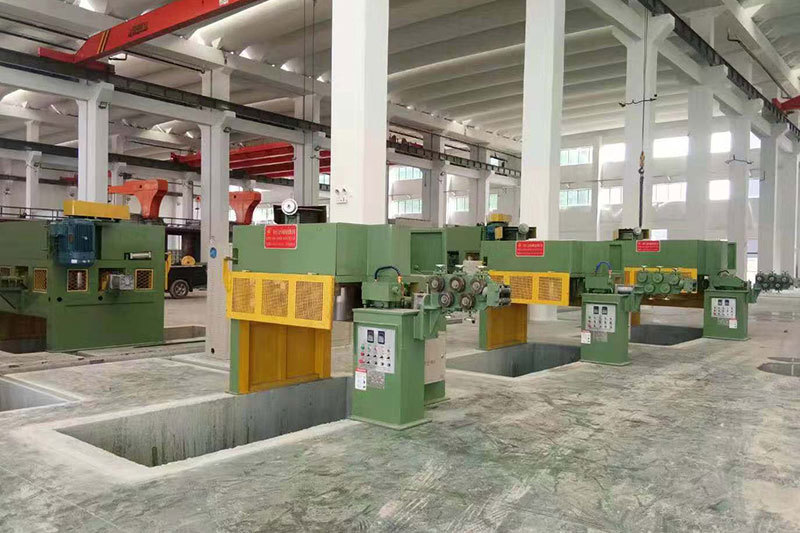A Comprehensive Guide to Bolt Cold Forging Machine Specifications: Enhance Your Manufacturing Process
Summary:
A Deep Dive into Bolt Cold Forging Machine Specifications
Table of Contents
1. Introduction to Bolt Cold Forging Machines
2. What is Cold Forging?
3. Importance of Bolt Cold Forging in Manufacturing
4. Key Specifications of Bolt Cold Forging Machines
4.1 Machine Capacity and Size
4.2 Material Handling Capabilities
4.3 Force and Pressure

A Deep Dive into Bolt Cold Forging Machine Specifications
Table of Contents
- 1. Introduction to Bolt Cold Forging Machines
- 2. What is Cold Forging?
- 3. Importance of Bolt Cold Forging in Manufacturing
- 4. Key Specifications of Bolt Cold Forging Machines
- 4.1 Machine Capacity and Size
- 4.2 Material Handling Capabilities
- 4.3 Force and Pressure Requirements
- 4.4 Energy Efficiency and Consumption
- 4.5 Control Systems and Automation
- 5. Types of Bolt Cold Forging Machines
- 6. Applications of Bolt Cold Forging Machines
- 7. Maintenance and Operation of Bolt Cold Forging Machines
- 8. Frequently Asked Questions
- 9. Conclusion
1. Introduction to Bolt Cold Forging Machines
In the dynamic landscape of manufacturing, **bolt cold forging machines** play a pivotal role in producing high-quality fasteners and components. These machines are designed to deform metal at room temperature, ensuring high strength and precise dimensions. Understanding the specifications of these machines is crucial for manufacturers seeking to enhance production efficiency and product quality.
2. What is Cold Forging?
Cold forging is a metalworking process that involves shaping metal parts at room temperature. Unlike hot forging, which relies on elevated temperatures to soften the material, cold forging utilizes high-pressure to deform the metal, resulting in superior mechanical properties. The process reduces material waste and allows for the creation of complex shapes with tight tolerances, making it an ideal choice for producing bolts and other fasteners.
3. Importance of Bolt Cold Forging in Manufacturing
The significance of bolt cold forging in **manufacturing** lies in its ability to produce **high-strength components** efficiently. The cold forging process enhances the grain structure of metals, resulting in materials that boast increased tensile strength and durability. Additionally, cold forged products often require minimal machining, reducing production time and costs.
4. Key Specifications of Bolt Cold Forging Machines
When selecting a bolt cold forging machine, it's essential to consider various specifications that affect performance and efficiency. Here are the key specifications that manufacturers should be aware of:
4.1 Machine Capacity and Size
The capacity of a bolt cold forging machine typically refers to the maximum size and weight of the workpiece it can handle. Machines designed for larger capacities can accommodate heavier materials and larger bolts, making them suitable for various applications. It's important to assess your production needs to choose a machine with the appropriate capacity.
4.2 Material Handling Capabilities
Material handling capabilities include the machine's ability to feed, position, and secure workpieces during the forging process. Advanced machines often come equipped with automatic feeding systems, reducing labor costs and increasing production efficiency. Features like adjustable tooling and quick changeover systems can further enhance material handling.
4.3 Force and Pressure Requirements
The force exerted during the forging process is a critical specification, as it determines the machine's ability to shape the material effectively. Bolt cold forging machines typically require high tonnage to achieve the necessary deformation. Understanding the force and pressure requirements for the specific materials you plan to forge is essential for selecting the right machine.
4.4 Energy Efficiency and Consumption
Energy efficiency is an important consideration in today's manufacturing environment, where operational costs can significantly impact profitability. Modern bolt cold forging machines are designed to minimize energy consumption while maintaining high performance. Look for machines with energy-efficient motors and systems that optimize power usage.
4.5 Control Systems and Automation
Control systems play a vital role in the operation of bolt cold forging machines. Advanced machines feature automated control systems that enhance precision and repeatability in the forging process. These systems often include programmable logic controllers (PLCs), user-friendly interfaces, and data logging capabilities to monitor machine performance and output.
5. Types of Bolt Cold Forging Machines
Bolt cold forging machines come in various types, each designed for specific applications and production requirements. Understanding these types can help manufacturers choose the right machine for their operations:
5.1 Single-Stroke Cold Forging Machines
Single-stroke machines are typically used for producing smaller components or lower volumes. They operate by delivering a single forging stroke, making them ideal for simpler shapes.
5.2 Multi-Stroke Cold Forging Machines
Multi-stroke machines can perform multiple forging operations in a single cycle, allowing for the production of more complex shapes. These machines are well-suited for high-volume applications.
5.3 Rotary Cold Forging Machines
Rotary machines utilize a rotating die to shape the workpiece, enabling high-speed production of bolts and fasteners. They are particularly effective for mass production and provide excellent dimensional accuracy.
5.4 Hydraulic Cold Forging Machines
Hydraulic machines use hydraulic power to exert force during the forging process. They offer flexibility in terms of adjustable force settings and are ideal for various forging applications.
6. Applications of Bolt Cold Forging Machines
Bolt cold forging machines find applications across diverse industries due to their efficiency and precision. Here are some notable applications:
6.1 Automotive Industry
The automotive industry relies heavily on cold forged components for manufacturing critical parts such as bolts, nuts, and other fasteners. These components ensure structural integrity and safety in vehicles.
6.2 Aerospace Sector
In aerospace applications, the lightweight and high-strength characteristics of cold forged components are essential. Bolt cold forging machines produce parts that meet stringent industry standards.
6.3 Construction and Heavy Machinery
Cold forged bolts are commonly used in construction and heavy machinery for their durability and strength. These components are crucial for assembling structures and machinery.
6.4 Electronics Manufacturing
The electronics industry utilizes cold forged components for connectors and other fasteners, benefiting from their precision and reliability in electronic assemblies.
7. Maintenance and Operation of Bolt Cold Forging Machines
Proper maintenance is vital for ensuring the longevity and efficiency of bolt cold forging machines. Here are some key maintenance tips:
7.1 Regular Inspections
Conduct regular inspections of the machine components, including dies, feeders, and hydraulic systems. Identifying wear and tear early can prevent costly breakdowns.
7.2 Lubrication
Ensure that all moving parts are adequately lubricated to reduce friction and wear. Regular lubrication schedules should be established based on machine usage.
7.3 Operator Training
Proper training for machine operators is essential for safe and efficient operation. Operators should be familiar with the machine's specifications and operational procedures.
8. Frequently Asked Questions
8.1 What materials can be processed with bolt cold forging machines?
Bolt cold forging machines can process a variety of materials, including carbon steel, stainless steel, and aluminum alloys. The choice of material depends on the specific requirements of the application.
8.2 How does cold forging compare to hot forging?
Cold forging occurs at room temperature, resulting in better mechanical properties and dimensional accuracy, while hot forging involves high temperatures that can lead to changes in material structure.
8.3 What is the typical lifespan of a bolt cold forging machine?
The lifespan of a bolt cold forging machine can vary based on usage, maintenance, and quality. With proper care, many machines can last for decades.
8.4 Are bolt cold forging machines energy efficient?
Yes, many modern bolt cold forging machines are designed to be energy efficient, utilizing advanced technologies to minimize energy consumption while maximizing output.
8.5 Can bolt cold forging machines be automated?
Yes, many bolt cold forging machines come with automation options, making it easier to integrate into modern manufacturing processes and improve overall productivity.
9. Conclusion
In summary, understanding the specifications and features of bolt cold forging machines is essential for manufacturers aiming to optimize their production processes. From machine capacity and force requirements to applications and maintenance, each aspect plays a critical role in achieving high-quality, efficient manufacturing. As industries continue to evolve, investing in advanced bolt cold forging technology will undoubtedly yield significant advantages in terms of quality, efficiency, and overall production capabilities.
PREVIOUS:
Latest News
AISEN Four axis nut tapping machine ready for shipment to Russia
Four axis nut tapping machine for DIN934 M8,M10 Standard hex nut is ready for shipping to Russia by land transportation.
AISEN machinery inverted wire drawing machine
We hope to cooperate with more customers for mutual development and benefits. You are welcome to contact us









